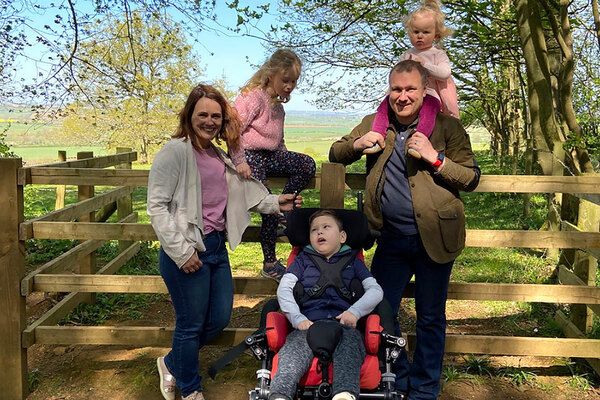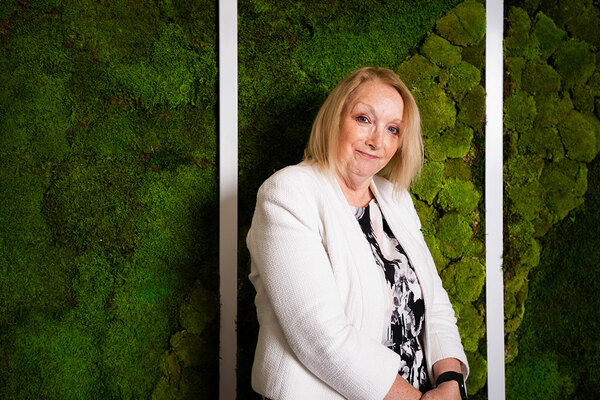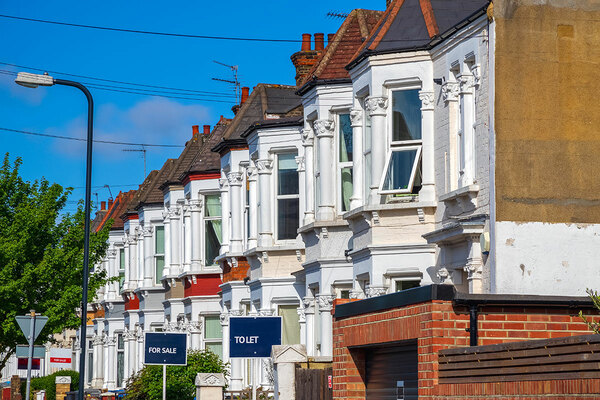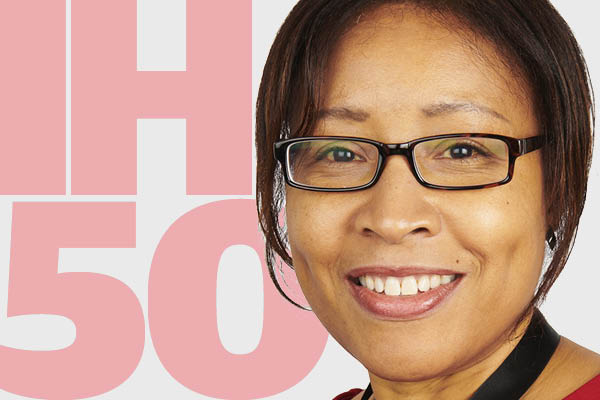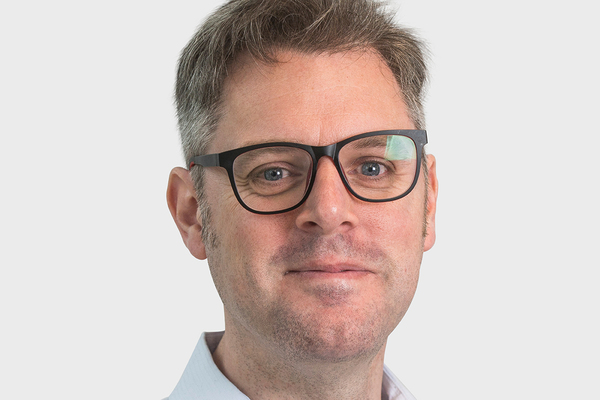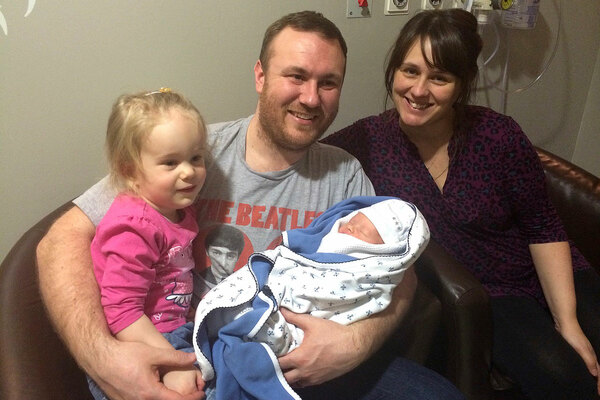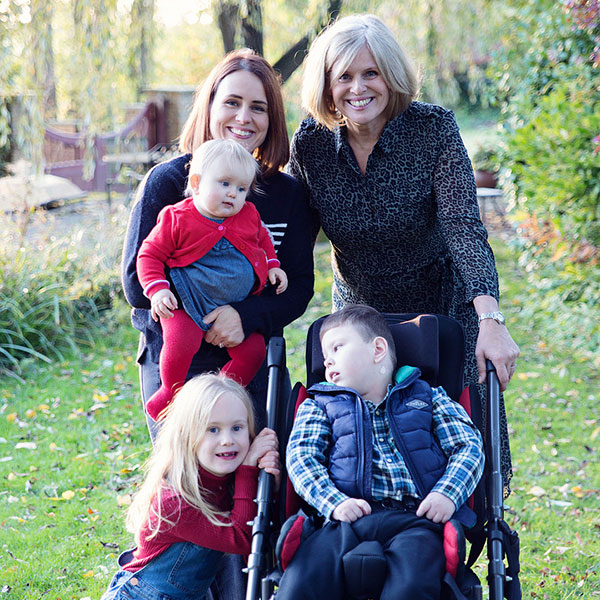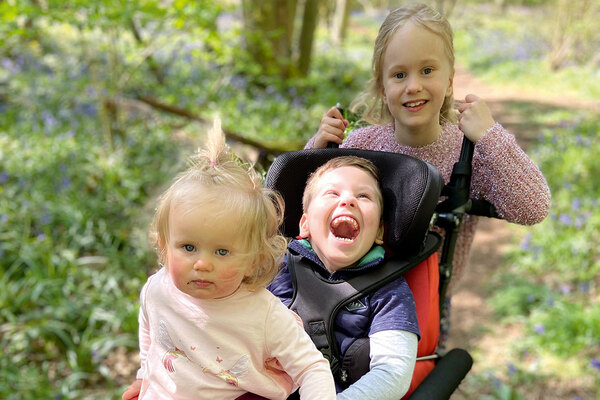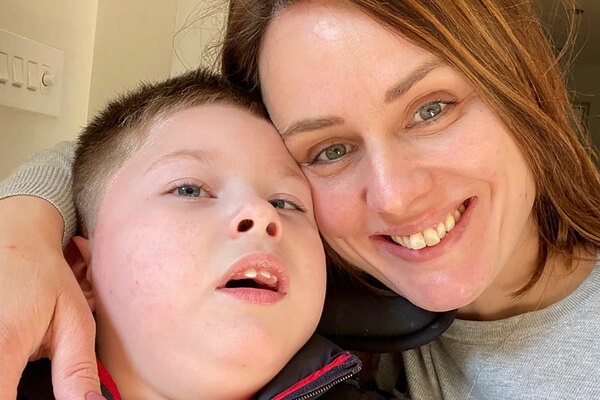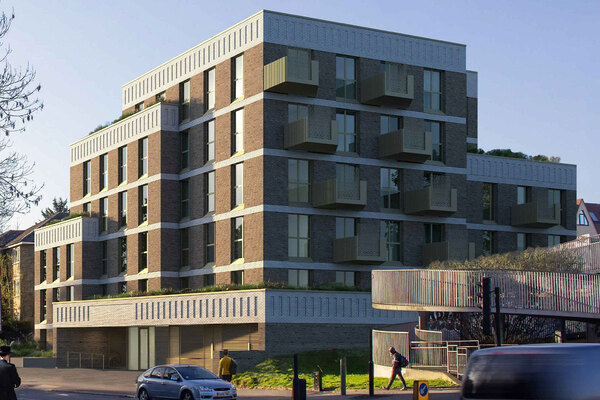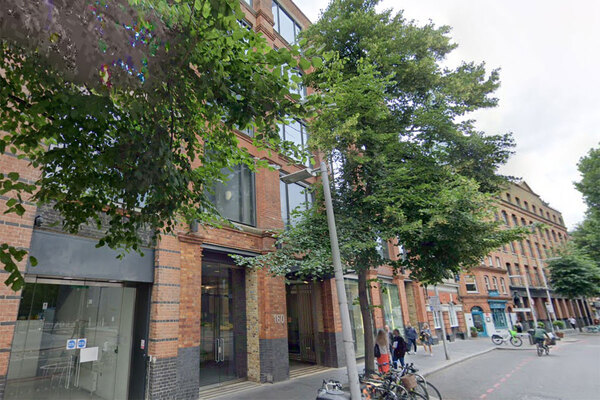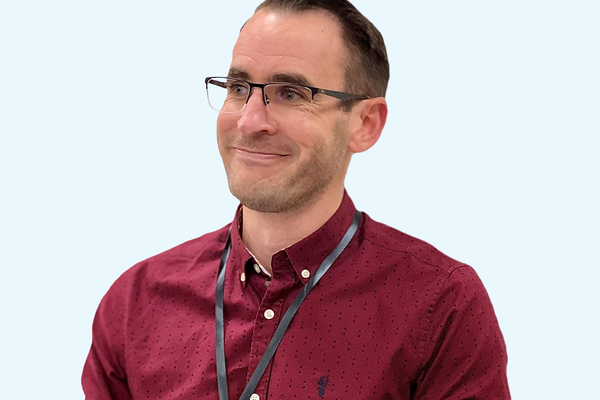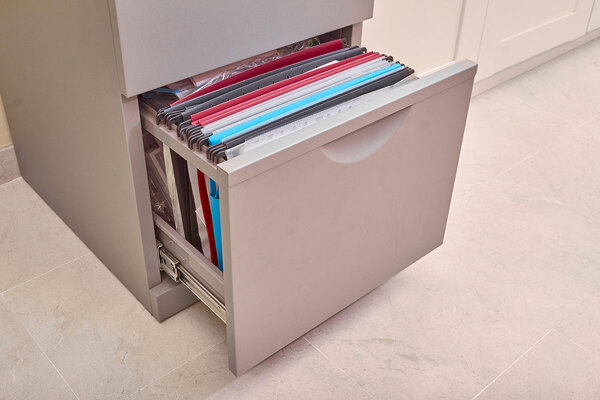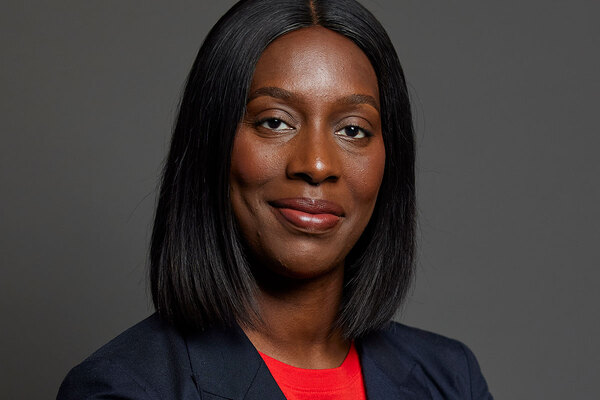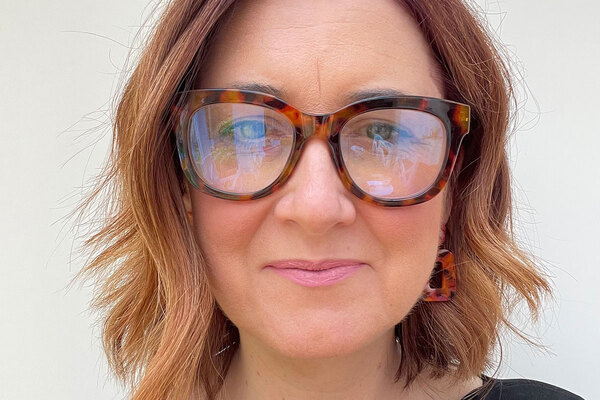You are viewing 1 of your 1 free articles
Caring during COVID-19: the family battling to change the system
Like many carers, the family of five-year-old Harry Charlesworth, who has quadriplegic cerebral palsy, face more challenges than usual during the coronavirus pandemic. But they’ve also got big ambitions to support other families and change the way the housing sector delivers for disabled people and carers. Martin Hilditch finds out how. Photography by Hayley Charlesworth and Lucy Woodrow
Life is more worrying than usual for everyone right now, but the Charlesworth family is under more strain than most.
Mum Hayley and dad Andy are currently shielding their family of five in order to protect their middle child, five-year-old Harry, who Hayley calls “our little smiler” (it is easy to see why from their numerous beaming photographs of him). Harry suffered severe brain damage at birth and has quadriplegic cerebral palsy. He is unable to hold his head up, eat or drink without the aid of a tube, and has difficulty breathing. He is registered blind and cannot talk, has painful muscle spasms and needs round-the-clock care.
“You would think with all the trauma you have gone through and then you have to look after a medically complex child that there would be some support"
Until recently, Harry would spend time at school and two nights a month at a local children’s hospice called Zoe’s Place, which has closed during the pandemic. Both provided a welcome respite break.
“Now it’s 24/7 demanding and worrying,” Hayley states. “It is emotionally tough.”
The Charlesworths are only one family among the UK’s 6.5 million unpaid carers. Last week, a survey by Carers UK, which drew more than 5,000 responses, found that, like Harry’s family, more than 70% are providing additional care due to the outbreak, with more than a third doing so as a result of local services reducing or closing. The charity referred to people like the Charlesworths as “forgotten families”.
While the family is unforgettable once you have spoken to them, over the past five years they have been pinballed around a system in which support has often appeared to be an afterthought, if it exists at all. If anything, the current crisis has magnified the impact of existing gaps, while creating new challenges to boot.
These additional problems include the cancellation of fundraising efforts for The Helping Harry Trust, which helps pay for the care, equipment and treatment Harry needs. The postponement of sponsored events has also hit a new initiative called Harry’s Pals, which the family launched earlier this year to offer respite breaks for carers and their families, counselling programmes for individuals or couples and a ‘buddy-up’ system whereby parents new to having a child with additional needs can receive support from parents who are further down the line.
What follows is the story of one family’s journey and their efforts to stay afloat and deliver support to others. But, through Harry’s Pals, the family is also campaigning for change that they want social landlords to embrace (they have strong links to the sector because Harry’s grandmother is Julie Doyle, chief executive of 23,000-home social landlord Longhurst Group). This includes delivering more homes that are appropriate for disabled people or people with accessibility issues. But it is also about how employers support staff who are carers when it comes to their mental health and the flexibility of their working arrangements.
It was on Harry’s second day of life that the family first realised something was wrong when he started having seizures. An MRI scan revealed that he had suffered strokes prior to being born that had left him with permanent brain damage. While Harry received some support for his physical needs, Hayley says the family were surprised when they realised there would be little wider support for them.
“When we were told the news about Harry, we thought we would be told, ‘Here’s your key worker,’” she states.
Harry as a baby with his family
“You would think with all the trauma you have gone through and then you have to look after a medically complex child that there would be some support.
“The occupational therapist came out to see him. But we didn’t get any support. I look back and think that wasn’t right.”
The family set up the Helping Harry Trust when Harry was two to help give him the best life possible by funding physio sessions (he gets one a month on the NHS, despite his painful muscle spasms), specialist equipment, carers and home adaptations. Harry’s Pals followed in January this year because the Charlesworths wanted to help other families by providing a support network, bespoke counselling and fund respite breaks. They also wanted to have an impact in the wider world by pushing businesses to think about the support they provide to families with care responsibilities.
Harry, with his grandmother Julie Doyle behind him
“My main focus is on raising the funds so we can send the families on respite breaks and link them up with therapy,” Hayley says. “One of the hardest things is having no breaks. You can end up not spending the time with their siblings or your partner that you wanted to.”
Although it had only been launched for a couple of months when coronavirus hit, the trust is already working with a dozen families and has offered a number of them respite breaks. Families are paired up and offered peer support to help “make sure people get what they are entitled to”.
“My view is that 20 years ago it wasn’t a given that you would have double-glazing. For me it’s the same. People have aids and adaptations budgets, but I would like it to be an essential part of our thinking”
Planned fundraising events have had to be cancelled, which threatens both the trust and the plans for Harry’s Pals, and talking to Inside Housing is in part an SOS for that reason.
“Counselling and therapy were needed before, but even more so now,” Hayley says. “It would be a shame to give that up at a time when it is needed most.”
A broader aim of Harry’s Pals is to push for wider societal and organisational change, which is why Hayley wanted a platform to speak to housing providers about their employment practices.
“I’ve met a lot of parents in similar boats to us,” says Hayley, who has given up her own career in marketing apart from the fundraising work. “Some have been able to get back to work but none of them have been supported. It is really sad, actually.”
Carers’ concerns
A Carers UK survey about coronavirus found:
- 70% of carers are providing more care because of the coronavirus outbreak
- More than a third (35%) of carers are providing more care as a result of local services reducing or closing
- 38% of carers agreed or strongly agreed with the statement: “I am worried about my financial situation”
- The majority (55%) of carers agreed or strongly agreed with the statement: “I feel overwhelmed and I am worried that I’m going to burn out in the coming weeks”
When carers are in the workplace, there is too often little understanding or support available to them, Hayley suggests. Like current Chartered Institute of Housing president Aileen Evans, who is looking to shine a light on the sector’s approach to mental health, Hayley thinks “mental health needs to be talked about more in the workplace” and support provided.
She would like to tell her story to businesses and help them think about the training that might be useful for their own staff. “It’s about making sure businesses are aware of the difficulties that carers face,” she states. The stories she has heard make her wonder “whether for some businesses it is easier to ignore it”, she says. Not only is this a strain on families who get forgotten in the system, but it means businesses end up losing experienced staff unnecessarily, she suggests.
Harry Charlesworth with his sisters Darcey and Lily
Then there is the design of homes. Research by Habinteg Housing Association last year found that just 7% of housing stock in England offers “even the most basic accessibility features”. And its survey of every draft and adopted local plan in England found that less than half set a specific requirement for a proportion of new homes to meet any form of accessible housing standards.
“Maybe the problem feels too big,” Longhurst’s Ms Doyle tells Inside Housing, speculating about why the sector – and government – shies away from talking about delivering more accessible housing.
But by discussing the issue, she hopes to drive change in a number of ways. One is by raising awareness of the small changes that providers can make to the system. Longhurst, for example, takes a proactive approach to minor “invisible” adaptations to homes “without compromising on design and appearance” – for example grab rails that look like plant pot holders.
Ms Doyle says that like many landlords, Longhurst has a journey to travel before it delivers the accessibility standards she would like to be mainstreamed. But she says there is no reason it cannot be done.
Harry and Hayley
“We are trying,” she says. “My view is that 20 years ago it wasn’t a given that you would have double-glazing. For me it’s the same. People have aids and adaptations budgets, but I would like it to be an essential part of our thinking.”
As the Habinteg research demonstrated, there is still some distance left to travel. Ms Doyle and the Charlesworths are keen to kick-start that conversation in the sector – and Inside Housing will work with Harry’s Pals to set up a wider discussion to take this forward (watch this space).
For the family, and Harry’s Pals, the future is tougher than it appeared at the start of the year. The fundraising will have to get even more creative – and Ms Doyle has just agreed to do a 64-mile horse ride to raise funds.
Despite the difficulties, the Charlesworths still have big ambitions to deliver change that will improve lives and prevent more people disappearing into a system of forgotten families.
For more information or to get in touch, contact Hayley at thehelpingharrytrust@gmail.com or visit the trust’s Go Fund Me page at www.gofundme.com/f/thehelpingharrytrust
For ideas on how social landlords can improve their approach to mental health, visit www.cih.org/resources/Shine%20a%20Light%20guide.pdf
More on coronavirus
To see all our coronavirus coverage to date – including the latest news, advice to providers, comment and analysis – use the link below.
Sign up for our care and support newsletter
Already have an account? Click here to manage your newsletters
